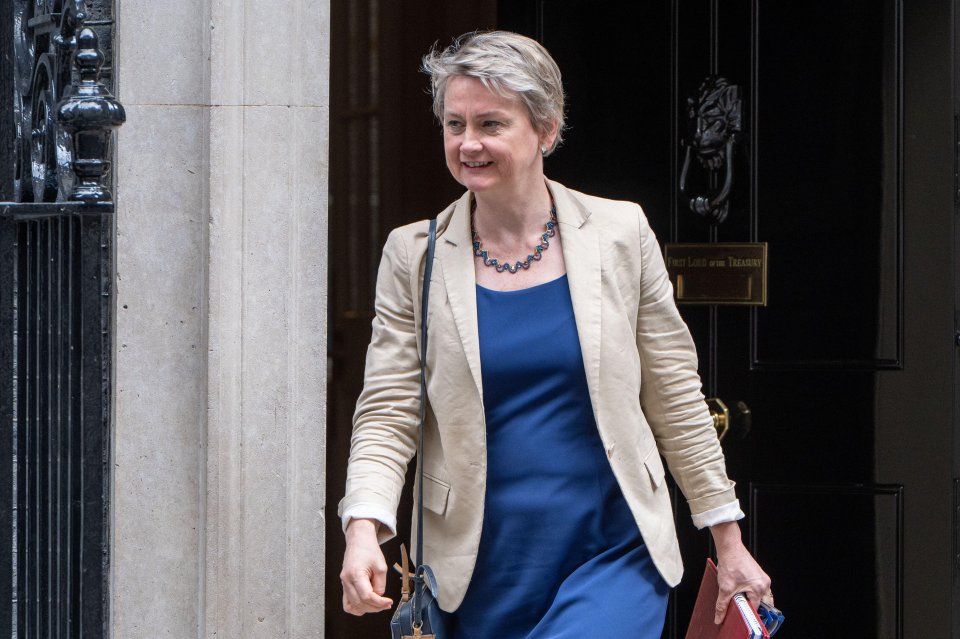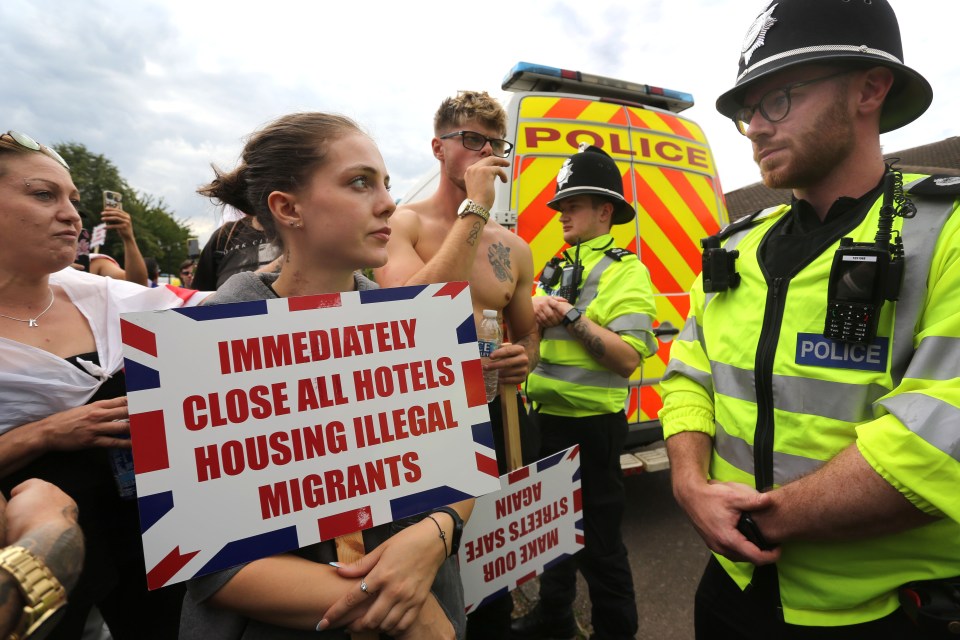REFORM UK is calling for Brits’ rights to be prioritised over those of foreigners with Nigel Farage to unveil his plans tomorrow.
Nigel Farage will call for fresh legislation for “liberty and free speech”.
Farage said that the “bill of rights” would include “the freedom to do everything, unless there’s a law that says you can’t”.
He claimed this is the opposite to the “concept of human rights”.
The Reform UK leader doesn’t want migrants to have a right to claim asylum here, and instead wants them to be arrested and detained in old military bases.
Farage also wants to have deals with countries where the highest number of migrants come over from.
This applies even if they have concerning records on human rights like in Afghanistan – where women and girls are being increasingly deprived of their rights and can’t even go outside by themselves and going to school is banned.
Zia Yusuf, a senior ally of Farage, told The Times: “It will have nothing in it to help activist judges to stop flights taking off.
“It will prioritise the rights of British citizens over foreign ones. We are not going to flinch.”
Farage would look at signing deals with Rwanda for migrants who cannot be returned to their country.
It comes after the expensive Rwanda plan – where some illegal migrants were going to be sent – was scrapped by Labour.
The plan received widespread criticism from charities and human rights groups, with the Supreme Court ruling it unlawful.
Farage said he would use a “carrot and stick” method, allowing a six month window for migrants to return on their own accord – paid for by the government.
Both Labour and the Tories slammed the plans.
Labour’s border security minister Angela Eagle insisted the government is tackling the “broken asylum system” and are ensuring those who are here illegally will be removed.
Chris Philp, the shadow home secretary, accused Farage of recycling the Conservative’s ideas.
He told The Times: “Nigel Farage previously claimed mass deportations were impossible, and now he says it’s his policy. Who knows what he’ll say next.”
The Human Rights Act 1998, which came into practice in 2000, sets out the fundamental rights and freedoms that everyone in the UK is entitled to.
This is regardless of someone’s immigration status, nationality, or origin.
The Act protects freedom of speech, religion and belief – but also bans torture and promises the right to a fair trial in court.
‘ACTIVIST’ JUDGES USING LOOPHOLES
Abolishing the Human Rights Act could put many lives at risk, especially for victims of slavery and human trafficking.
But judges sitting on asylum cases have been heavily criticised for using human rights “loopholes” to avoid deporting illegal migrants and criminals.
The Sun has reported on a number of cases, including a migrant being allowed to stay because his son hated foreign chicken nuggets.
In another case, a people smuggler who trafficked nine adults and two children argued that being deported would be too disruptive for his kids – but he was deported anyway.
And a deported knifeman is allowed to return to the UK after an immigration judge ruled he had “matured”.
Italian Prince Umoh, 30, was banned from Britain for two “very serious” street muggings in 2015.
Umoh was the “ringleader” of a gang who would threaten people at knifepoint to steal their mobile phones.
He was deported in June 2015, but illegally returned to the UK, which saw him jailed and thrown out of the country again in November 2016.
But an upper immigration tribunal has now ended his ban after it decided he had been successfully rehabilitated and is “committed to a lawful lifestyle”.
After a spate of similar cases, The Home Office is now looking into how judges use Article 8 of the European Convention on Human Rights – the “right to a family life” – to block deportations.
The move marks a stunning shift for Sir Keir Starmer, a lifelong defender of the ECHR, who has repeatedly backed the court’s role in UK law.
ASYLUM SEEKER HOTELS
It comes amid weeks of protests outside of hotels housing asylum seekers around the country.
This Bank Holiday weekend has seen around 27 demonstrations are taking place.
It comes after the High Court granted Epping Forest District Council a temporary injunction to remove asylum seekers from the Bell Hotel in Epping, Essex, from September 12.
Regular protests had been held outside the hotel in recent weeks after an asylum seeker was charged with trying to kiss a 14-year-old girl, which he denies.
Other local councils also publicly announced their intention to seek legal advice as to whether they could achieve a similar injunction for hotels in their areas.
The Government announced plans to appeal against the High Court’s refusal to allow it to intervene in the case, and to further appeal against the temporary injunction.
Mr Justice Eyre made his judgement after refusing an 11th-hour effort from Home Secretary Yvette Cooper to get the council’s case dismissed.
The High Court refused to allow the Government to intervene in the Bell Hotel case.
But security minister Dan Jarvis said the Home Office will appeal this decision.
If successful, this could lead to the Government appealing a temporary injunction blocking the Home Office from using the Bell Hotel as asylum accommodation entirely.
They have to be an interested party in order to lodge an appeal.
Somani Hotels, the owner of the Bell Hotel in Epping, will also appeal against the court order, the company’s solicitors have said.
Jarvis said closing hotels housing asylum seekers must be done “in a managed and ordered way” as he unveiled Government plans to challenge the High Court’s decision related to the Bell Hotel in Epping.
It comes after it was revealed that a record number of people claimed asylum in the UK in the last year – with a massive 32,000 currently living in taxpayer-funded hotels.
Home Office data shows that 111,000 people claimed asylum in the year ending June 2025 up 14 per cent on last year.
It is higher than the previous recorded peak of 103,000 which was set in 2002.
The number of people claiming asylum in this country has almost doubled since 2021.
What has the Home Secretary said?
Home Secretary Yvette Cooper said: “This government inherited an asylum system in chaos, with decision-making at a standstill, the backlog soaring, and tens of thousands of asylum seekers staying in expensive asylum hotels with no prospect of their case being resolved.
“As set out in our manifesto, this Government will end asylum hotels and bring the number of people in the asylum accommodation system right back down. We have already taken immediate action to start fixing the broken system we inherited, doubling the rate of asylum decision-making, increasing the removal of failed asylum-seekers by almost 30 per cent, and taking action to prevent overseas workers and students claiming UK asylum when their visas expire.
“The number of asylum hotels is now around half what it was at its peak under the previous government, when more than 400 hotels were in use at a cost of almost £9 million per day. Over the course of 2024/25, we reduced the cost of asylum hotels by almost a billion pounds compared to the previous financial year.
“But we have committed to go much further to reduce those costs, and to end the use of asylum hotels entirely.
“In recent months, we have set out plans to deliver that commitment, including reducing the number of people entering the system, increasing and speeding up the returns of failed asylum-seekers, overhauling the broken appeals system we inherited so that failed asylum seekers do not stay in the system for years, and putting in place more appropriate accommodation for those who genuinely need it.
“We agree with communities across the country that all asylum hotels need to close, including the Bell Hotel, and we are working to do so as swiftly as possible as part of an orderly, planned and sustained programme that avoids simply creating problems for other areas or local councils as a result of piecemeal court decisions or a return to the kind of chaos which led to so many hotels being opened in the first place.
“That is the reason for the Home Office appeal in this case, to ensure that going forward, the closure of all hotels can be done in a properly managed way right across the country without creating problems for other areas and local councils.
“What we cannot have is a replica of the chaotic and disorderly situation that we saw under the previous government in 2022, when 140 extra hotels were opened in the space of six months because they lost control of the system. The previous government which caused that chaos is now trying to pretend that their time in office didn’t happen, and are simply trying to make the situation worse.
“While they play politics with this issue, we will get on with the job of sorting out the mess that they left behind, closing every one of the hotels that they opened, and doing so in a controlled and managed way.”




















